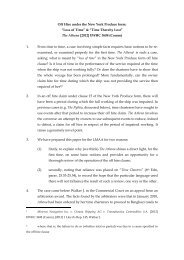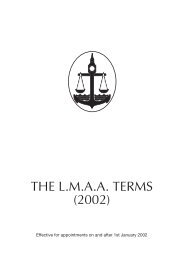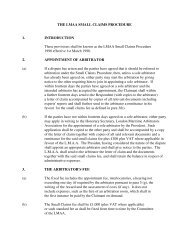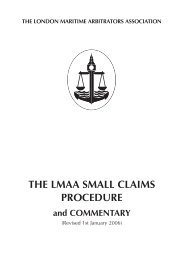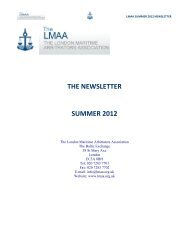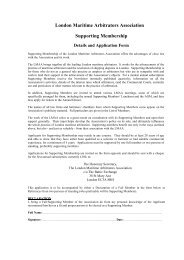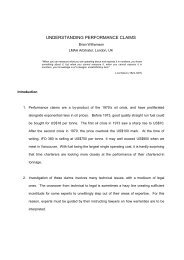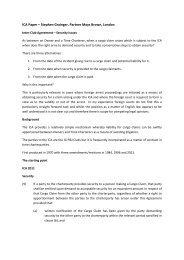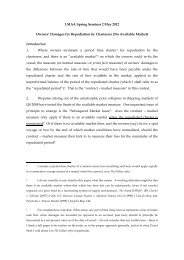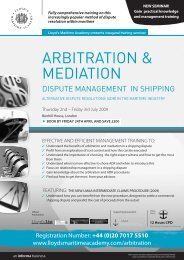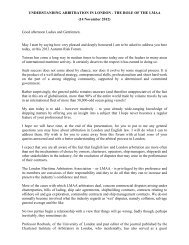Journal Article - LMAA | London Maritime Arbitrators Association
Journal Article - LMAA | London Maritime Arbitrators Association
Journal Article - LMAA | London Maritime Arbitrators Association
Create successful ePaper yourself
Turn your PDF publications into a flip-book with our unique Google optimized e-Paper software.
118 Arbitration<br />
Nowadays, the concept of the arbitrator-advocate seems a strange one to us. That is<br />
partly because, due to some changes in shipping practices and in English arbitration law,<br />
the umpire is nowadays almost unknown, having been replaced by a third arbitrator who<br />
acts in conjunction with the other two arbitrators. It is also partly because the recent and<br />
present generations of arbitrators, unlike some of their predecessors, do not seek to take<br />
any position in relation to the disputes on which they have to adjudicate other than that<br />
which seems to them to be correct on their understanding of the evidence and the law.<br />
In 1960, arbitrators whose names were on the Baltic list decided to form themselves into<br />
an association—the <strong>London</strong> <strong>Maritime</strong> <strong>Arbitrators</strong> <strong>Association</strong> (<strong>LMAA</strong>). Some of you will<br />
know that the <strong>Association</strong> has just celebrated its 50th anniversary with a very successful<br />
one-day conference and a dinner attended by more than 675 people in the heart of the City<br />
of <strong>London</strong>. I shall talk more about the <strong>LMAA</strong> shortly.<br />
Another consequence of the fact that Britain was at the heart of commerce and maritime<br />
activity was the creation, hundreds of years ago, of a specialist Admiralty Court to deal<br />
with shipping matters. In those days the problems with which the court was faced were<br />
predominantly to do with matters such as collisions, salvage, cargo damage, crew’s rights,<br />
bottomry bonds, general average and the like, but commercial contractual disputes also<br />
turned up from time to time.<br />
Towards the end of the 19th century, it became apparent that a great deal of commercial<br />
(and particularly shipping) work was coming to the English courts and that it required<br />
specialist attention. Indeed, in one case, the Court of Appeal was extremely rude about one<br />
judge who did not have the relevant experience, and who made a complete mess of a<br />
commercial dispute he had to decide. Accordingly, a specialist Commercial Court was set<br />
up. That marked something of a turning point for the development of English commercial<br />
law, since it seems to have attracted to <strong>London</strong> a large number of litigants from overseas.<br />
Nowadays the court has available 16 specialist judges, of whom at any one time about half<br />
will be sitting hearing commercial disputes. It is perhaps necessary here to explain that<br />
English judges are not trained as professional judges, but rather come from the ranks of the<br />
Bar where they have worked as advocates, usually for 25 years or more. Those who sit as<br />
commercial judges will have had very considerable experience at the Commercial Bar. The<br />
English Commercial Court now enjoys a reputation which I believe to be second to none<br />
in the commercial world at large.<br />
One more matter of history (although I do not pretend to have covered every single<br />
element): after the end of World War II there was a huge expansion of international trade<br />
which, inevitably, meant a huge expansion in maritime activity around the world. At that<br />
time, because of the importance of Lloyd’s, the Baltic Exchange, the P&I Clubs that had<br />
developed in the United Kingdom, the commodity trade associations which had established<br />
themselves in <strong>London</strong> and similar factors, <strong>London</strong>’s position at the centre of this trading<br />
world was immeasurably strengthened.<br />
3. Circumstances<br />
I have already indicated that there is inevitably an overlap between the various headings<br />
that I have identified, and this is where the first obvious example occurs. The circumstances<br />
that presently prevail and in which <strong>London</strong> finds itself as the premier centre for maritime<br />
arbitration in the world, are of course derived from the matters of history to which I have<br />
referred. And because history is a continuum, those considerations still apply, although<br />
sometimes with a different force from that which they previously had.<br />
As it seems to me, the reasons why <strong>London</strong> is now the predominant centre of maritime<br />
arbitration are (leaving on one side the fact that I believe <strong>London</strong> is chosen almost<br />
automatically in many instances when contracts are being negotiated, without much thought<br />
(2011) 77 Arbitration, Issue 1 © 2011 Chartered Institute of <strong>Arbitrators</strong>



